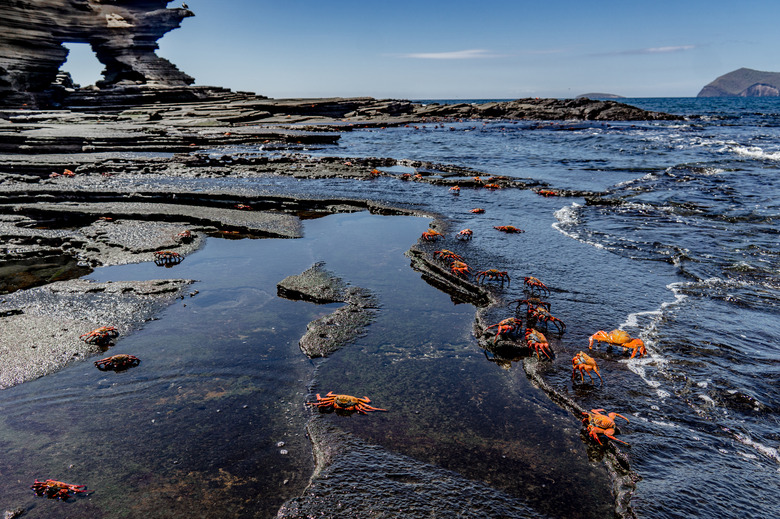Too Much Noise Stresses Crabs Out — And It Can Be Deadly
You're not the only crab that gets stressed.
It turns out, actual crabs get so stressed out from noise pollution that it can endanger their lives.
A new study took a look at shore crabs that live along the coast of England. It found that when they were exposed to natural underwater noises, they were mostly unbothered. But when it came to artificial noises from sources like cruise ships and giant oil tankers, the crabs stress levels spiked.
And when their stress went up, their abilities to camouflage went down. The researchers took some shore crabs to their lab and exposed half the bunch to natural sounds, and the other half to noise pollution like the sound of ships.
By the end of the experiment, the ones exposed to natural sounds had changed their colors to fit in with their temporary tanks. But the ones who had heard ship noises had only managed to transform about half as well as the other group. Plus, they found that the ship noises group was far slower to run when they heard the noise of a predator.
This highlights the way that the stress of noise pollution harms shore crabs – not only are they more vulnerable to attack since they can't blend into their surroundings as well, but they're also slower to escape danger.
We already knew that noise pollution can affect both land and sea creatures who use their own noises to talk to each other, since sounds like traffic, construction, airplanes and ships can all interfere with their communication. But this new study shows how even animals that don't rely on sound to communicate with each other can still be affected by human noise.
Blending In
Blending In
Camouflage is one of the most important ways that underwater animals like crabs, squid and octopuses protect themselves from predators. You can find incredible YouTube videos that show animals like octopuses blending into their surroundings, even shifting their shape and texture to impressively mimic the world around them. Sometimes, it prevents bigger animals from spotting the octopuses and eating them.
Other times, it helps the octopuses look like nonthreatening stuff like coral. That way, they can lay low, stalk some prey, and then leap out and attack a nearby fish who thought they were just casually swimming near some rocks.
In animals like octopuses, this ability is thanks to cells called chromatophores. Inside each one is a sack stuffed with pigment, and the animals can use an incredibly complex set of nerves and muscles to make them change within seconds. The amazing thing is that they can do this despite often being colorblind – their bodies just figure out a way to match even if their eyes only see black and white.
Scientists want to get their hands on this ability. After all, how cool would it be to have makeup or clothes that could change color at will? The military also wants to figure out how they could turn this unique ability into some stealth materials.
But although they've learned a lot about this ability in animals, they haven't yet been able to make products that give humans total camouflage powers.
Stopping the Noise
Stopping the Noise
As little as we may know about how animals use the power of camouflage, though, we are finding out more and more how our own presence on Earth interferes with their ability to blend in.
It's not the only way that humans are stressing out animals. Take the clownfish, also known as the "Finding Nemo" fish. Researchers found that coral bleaching raises the levels of cortisol, the hormone that controls stress, in clownfish. That made their fertility levels plunge, which was bad for a population already threatened by rising sea levels.
Moral of the story? It's a stressful time to be alive – for humans and underwater animals alike.
Cite This Article
MLA
Dragani, Rachelle. "Too Much Noise Stresses Crabs Out — And It Can Be Deadly" sciencing.com, https://www.sciencing.com/how-noise-affects-ocean-wildlife-13725590/. 19 March 2020.
APA
Dragani, Rachelle. (2020, March 19). Too Much Noise Stresses Crabs Out — And It Can Be Deadly. sciencing.com. Retrieved from https://www.sciencing.com/how-noise-affects-ocean-wildlife-13725590/
Chicago
Dragani, Rachelle. Too Much Noise Stresses Crabs Out — And It Can Be Deadly last modified March 24, 2022. https://www.sciencing.com/how-noise-affects-ocean-wildlife-13725590/
